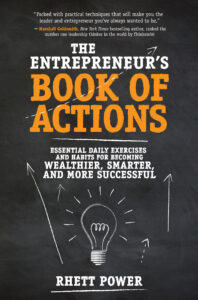Become Wealthier, Smarter, and More Successful
Do you want to break old habits?
Do you want to manage your time more effectively?
Do you want to motivate your staff and be a more effective leader?
Rhett Power is cofounder of the toy company Wild Creations, named one of Inc. Magazine’s fastest-growing companies. He is a speaker and author and has written for numerous publications from Time to the Wall Street Journal. I recently spoke to him about his research on success.
He says that success today isn’t just taking a few steps, but it is available to all if you take action day after day, week after week. Rhett’s new book, The Entrepreneurs Book of Actions: Essential Daily Exercises and Habits for Becoming Wealthier, Smarter, and More Successful, focuses on 53 weeks to accomplish lasting change and success.
Why Personal Development is Critically Important
As a busy entrepreneur, with multiple conflicting to-do lists, how do you prioritize personal development? Why is this critically important?
In my first business, I learned that if I didn’t take the time for personal development, then my business would suffer. I buried myself into making that first business work. I worked 20 hours a day seven days a week. After two years, I was nearly bankrupt, and I was physically and emotionally wiped out. I wasn’t reading, eating well, exercising, or spending time with family and friends. When I stopped to reevaluate my life and made significant changes, I saw dramatic results.
I started taking more time out of the business. When I was well rested, I made better decisions. When I started exercising, I had more energy and was more productive. When I started to take time for personal and professional growth, meaning spending time reading, researching, and planning, my business took off.
Overcome Your Fears
Let’s start with overcoming fears. You faced some seriously challenging days and, in the end, you now say that facing a fear helps you gain strength. What practical tips can you share for someone who feels paralyzed with fear?
 I have always believed I would rather have my fate in my own hands than in someone else’s. That is why I kept going even when times were tough, and I was scared we were going to fail. It’s important to understand that significant fear cannot be overcome overnight. That’s why it’s significant. To effectively deal with this kind of fear, it’s helpful to break down the object of your fear into small, more manageable parts. One of the benefits of breaking down a task that you fear is it can provide you with some insight as to what, specifically, about the task causes you to have fear.
I have always believed I would rather have my fate in my own hands than in someone else’s. That is why I kept going even when times were tough, and I was scared we were going to fail. It’s important to understand that significant fear cannot be overcome overnight. That’s why it’s significant. To effectively deal with this kind of fear, it’s helpful to break down the object of your fear into small, more manageable parts. One of the benefits of breaking down a task that you fear is it can provide you with some insight as to what, specifically, about the task causes you to have fear.
The other thing that always makes me less fearful is preparation. Everyone remembers the feeling of confidence you get from being ready for that school exam. You also know the feeling of not being prepared. I find being over-prepared makes that feeling of fear turn into confidence.
Each time you face a fear, no matter how small, and overcome it, you gain great strength. That strength turns to courage and that courage to confidence in the doing–no matter what “doing” you might be called upon to do.
Reward and Recognize Good Work
You share the importance of valuing employees. As an entrepreneur, you also know that resources are often a challenge. What creative ways have you seen to accomplish this goal on a limited budget?
Even on the tightest budget, you should recognize and reward great work. Here are some things I do in my businesses:
- Ask staff to post recognition notes to each other on a bulletin board. Add testimonies from external customers.
- Give people time off. Time is the most precious gift, and people will always remember that afternoon or day to do what they love.
- Send a letter to the employee’s family, telling them why their loved one is so important to the company’s mission.
- Do one of the employee’s least favorite tasks.
- Give a coffee or carwash gift card, sports or movie tickets.
- Allow people to work from home or present them with a “flexible day” certificate.
- Give departments their own week: Accounting Week, Programmer Week, etc. Recognize the contributions made, take them to lunch, make certificates.
- Create opportunities: to be a mentor, chair a committee, do research.
- Celebrate birthdays, babies, weddings, graduations, and any happy time.
- Establish a “Wall of Fame” for photos and clippings that recognize outstanding achievements. Mention staff in the company newsletter, too.
- Say, “I’m glad you’re here,” and “Thank you.”
- Bring people together for cake and socializing or a meal like a potluck lunch.
Boost Your Bliss
Boosting your bliss starts with gratitude. I love this section and am a believer. What methods work to increase your gratitude?
“I will live every moment to its fullest and find happiness around every corner.”
These are words that I live by but also one of the hardest things to achieve. It so easy for us to get caught up in the negative that is all around us in today’s world. How do you tune all of that out? Frankly, it’s impossible to tune it all out, but I believe if you do the following, you will have more bliss and more gratitude in your life:
- Look for relationships that inspire you and add some positivity
- Make a list of “deal breakers” – the activities you are no longer going to engage in
- Take care of your body and your mind
Gratitude is hard to have when you are feeling overworked and stressed. If you work hard to alleviate some of the key stressors in your life, you can focus on having more bliss, and I believe we all deserve more bliss.
Take Time for You
You’re an advocate of alone time. Why is this so critical? How do you manage this in the midst of all of the pressures of running a business?
Alone time for me is essential to focus. I’ve never been diagnosed, but I have ADD, and if I don’t take time away from the office and all the distractions, I wouldn’t get anything done. I take a day out of the office once a week. I go and sit in the local coffee shop to work on the things that I haven’t gotten done that week and that I know are important. The business doesn’t suffer. In fact, I would argue it’s better off because I get the tough things done that require me to focus and think. It feels really good to attack my to-do list and scratch things off that have been on it all week and that I haven’t had the time or energy to deal with. That’s why alone time can be really valuable.
Learn to Say No
No, no, no. Success is often the ability to say no. Why is this so difficult for most people? How do you coach someone who struggles in this area?
For most of us, telling someone no is hard to do. We don’t like to disappoint others, and no is not a word we associate with making someone happy. But I believe learning how to say no is essential for business success. I have my clients who have trouble saying no make the following rules:
- If it costs more than you can afford, say “no.” If it’s a great idea, put it in the budget for next year.
- If it doesn’t fit with your company’s vision and values, look away. You know what you’re good at and how you see the future. If an offer or idea doesn’t quite align with your plans, say “no.”
- Decide how your business will handle situations like last minute or urgent requests, charity donations, or invitations to sponsor a soccer team. Deciding ahead of time what will give you the best return on investment can make it easier when you say “no.”
These rules generally work. I tested them recently when I had a client who had a really hard time saying no. I told him that I had to triple my rates in the next quarter. He said no, that this wasn’t in his budget. I was proud of him, but I was out of a client.
At the end of the book, you talk about turning weakness into power. You say your weaknesses will make me great. Talk a little about weakness. 
We all have weaknesses, but most of us fail to face them. That is the difference between super successful people and everyone else. If you acknowledge and face those weaknesses, then you can turn them into strengths.
One of my weaknesses is I like control. I’ve had to learn to delegate the tasks I’m not good at and that take me more time to accomplish. By learning to give up a little control and focusing on what I am good at, I am able to concentrate on what is critical for the business to grow. It doesn’t mean I don’t have to pay attention to the small stuff, but I don’t have to spend six hours trying to get the formatting right on the company newsletter, a job my 13-year-old can do in 10 minutes. Learning to delegate made me a more effective leader.
I obviously didn’t have 53 weeks to read your book to complete this interview, but now I will slow down and go through it. Why did you decide to write it in this weekly format?
I wrote the book and the activities in this format because I want people to work on these tasks every day for a year. I want people to create success habits. The only way to do that is through repetition and focus. It’s like going to the gym or working out. We have to get in the habit of doing that 30-minute workout every day. The only way for us to gain lasting benefit from those workouts is to make them a habit. I believe constant self-improvement is as important as that physical workout and something we should work on every day.
For more information:

